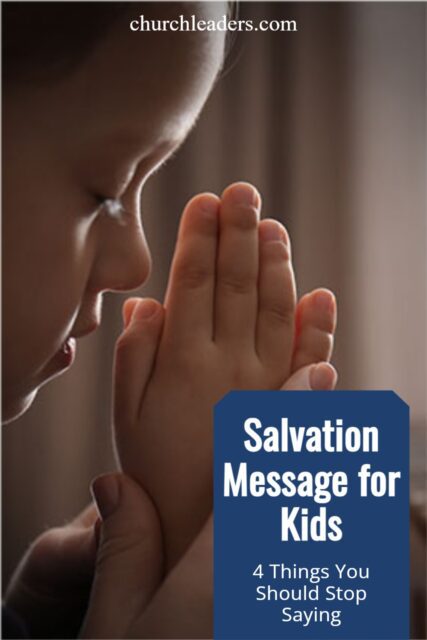Because I’ve written about Five Principles for a Salvation Message, I try to be acutely aware of the words and phrases I use. When talking to children about putting their faith in Jesus, it’s important to remember that they understand abstract concepts differently from adults. To clearly explain the meaning of believing in and following Jesus, use care when presenting a salvation message for kids.
It’s best to avoid these 4 caveats and phrases when sharing a salvation message for kids:
1. “Invite Jesus into your heart.”
After giving a talk on creating a meaningful salvation message for kids, a leader asked, “Why aren’t the kids responding to our invitation to have Jesus come live in their heart? Who wouldn’t want Jesus living inside them?!”
And while I agree with that intent, think about the reality of how children might understand this concept:
Jesus—who you’ve just told them is a real adult human being—will somehow INHABIT THEIR BODY. How does He get in there? Do you swallow Him? Do I need a special surgery? Where will He live? What will He eat?
Children have many questions about this phrase, which yield confusing and possibly disturbing answers. Kids attach what they hear to what they know. Kids have a hard time understanding metaphors and abstract associations. So for a child: Jesus + Inside + My + Heart = GROSS!
2. “Once you believe in Jesus, everything will be better.”
Sure, of course this is true. But it’s not true how a child might envision this being true.
Let’s say… I’m living in poverty. I have one full meal a day. I sleep on the floor. And wear the same clothes every day. Or my parents are separating with no hope of reconciliation. Or I’m not that great in school. I can never get higher than a C on my test and quizzes.
Then one Sunday I hear a message about this Jesus who lived and died and rose again for me. And that when I put my faith in Him, everything will be better because He is with me. I put my trust in Him with all my heart. I believe that this, all that you just told me about my new life with Christ, is true.
And I wait… Wait for my economic position to change. Wait for my parents to reconcile Wait for my grades to improve.
After all, I was told that my life should be better, right? But it’s not.
And now I start to wonder if this Jesus thing didn’t work. Maybe my prayer wasn’t the right prayer or I didn’t have enough faith. Because I was told my life would be better… But. It’s. Not.
As adults, our brains can understand that “better” might mean something emotional, something closer to a peace with our situation or a new-found determination to help change it. “Better” might be having a community of like-minded friends who will help us through what we’re facing.
Jesus never promises that life will be “better.” He actually promises that life will often be difficult because of our faith in him (see: Matthew 7:13-14, Mark 8:34-35, Luke 10:3, John 16:33). But he also promises to be with us. And that’s what makes life better. We’re no longer alone. We have hope that Jesus has overcome the world. No matter what we face, we know He has won, and eventually, all will be made new.
In the meantime, we’re promised a peace that passes understanding as we travel in a world still broken by sin. “Better” is true. But only in as much as a child can understand the abstract meaning behind that word. Be careful that the words in your salvation message for kids don’t set them up for disappointment.


